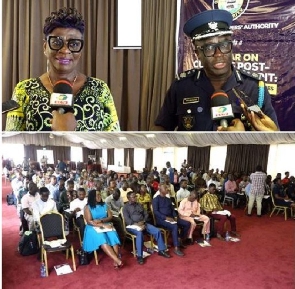 Benonita Bismarck (top L) with Evans Teye Agbozo (top R)
Benonita Bismarck (top L) with Evans Teye Agbozo (top R)
Importers and Exporters have been advised to refrain from engaging in unlawful practices to reduce duty payments, as they may face consequences during the Post Clearance Audit process.
This came up during a seminar on Customs Post Clearance Audit organized by the Ghana Shippers' Authority (GSA) in Kumasi.
The seminar was organized in response to recurrent complaints from importers and exporters regarding the financial inconveniences they face after undergoing the Post Clearance Audit conducted by the Ghana Revenue Authority.
The objective of the Post Clearance Audit is to verify the accuracy and correctness of the information provided by importers or exporters during the customs clearance process. It aims to identify any errors, omissions, or irregularities in customs declarations, such as incorrect valuation, misclassification of goods, inaccurate determination of origin, or discrepancies in quantities or weights.
The Deputy Ashanti Regional Commander for Customs, Evans Teye Agbozo explained that the Post Clearance Audit is mandated by law, and only importers and exporters who try to circumvent duty payment will be held liable and required to pay any differences found after the audit.
“If you clear your goods six years later, we can still come to you and visit you. So basically, the only challenge to post-clearance audit towards traders is just to be compliant” he emphasized.
Ms. Benonita Bismarck, the CEO of the Ghana Shippers' Authority, stated that the Authority's aim is to ensure that importers and exporters are well-informed to avoid actions that may lead to future difficulties.
“It is instructive to note that in the execution of our mandate, the Ghana Shippers Authority regularly interacts with shippers to get real-time information on bottlenecks they face in the conduct of their business and take steps to resolve these bottlenecks in other to make the shippers business smoother.”
Participants at the seminar were drawn from the Ashanti, Bono, Bono East, and Ahafo Regions. They expressed their enthusiasm and urged the GRA to conduct regular educational sessions on similar challenges to empower them.